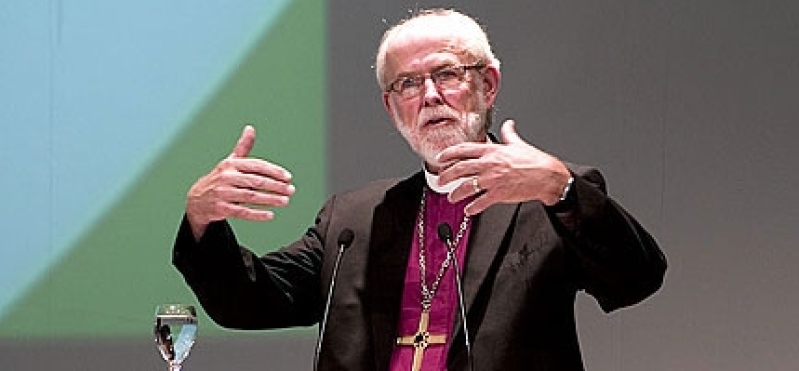
Talks of a continued commitment toward ecumenism, or church unity, dominated the stage Wednesday at the Lutheran World Federation's assembly.
The Lutheran commitment to ecumenism will not end until we can share the Eucharist with other churches, LWF President Bishop Mark S. Hanson said Wednesday at the assembly, which is being held in Stuttgart, Germany.
"If Roman Catholics and Lutherans [for example] can feed the hungry together, wouldn’t it be good if they could be fed at the Lord’s Table together?" he posed.
LWF is the world's largest communion of Lutheran churches, representing over 70 million Christians in 79 countries. It holds an assembly every six years. This year's meeting drew leaders and representatives from the Roman Catholic Church, the Eastern Orthodox Church, the Anglican Communion, the United Methodist Church and the World Communion of Reformed Churches.
LWF has pursued deeper relations with each of the global church bodies. One of the landmark ecumenical events was the 1999 signing of the Joint Declaration on the Doctrine of Justification
"To be the Lutheran World Federation: A Communion of Churches is to be ecumenical," said Hanson in his report. "When a radically inclusive communion is God’s gift to us in Christ and at the center of our self-understanding we will always define ourselves first in terms of our relatedness to others in the body of Christ.
"We gather in Stuttgart as more than fragments who momentarily put together the semblance of a whole. We gather because we are one by God’s grace through the death and resurrection of Jesus Christ. God’s gift of unity will be experienced and expressed again and again in the midst of our varied diversity and even our differences."
Regarding differences on human sexuality, Hanson encouraged Christians to begin the conversation by identifying what they have in common – such as "we are all sexual beings" – rather than from a position of judgment. His comments come nearly a year after the Evangelical Lutheran Church in America, of which he is the presiding bishop, opened the door to allow partnered gays and lesbians to serve as clergy.
He expressed concerns over emerging conversations in some Lutheran churches about what it means to be truly Lutheran.
"I sense that there is a growing desire on the part of some to look at our rich, shared confessions not as a reason for conversation about how we can live in that confessional tradition, but rather as a way of determining who is truly Lutheran and who is not," he said, noting that he desires to see full unity among Lutherans themselves. "That would be an unfortunate breakdown."
Hanson called for not only affirming the theological and confessional foundations they share as Lutherans, but also for renewing a commitment "that to be Lutheran is to be both evangelical and ecumenical."
LWF General Secretary the Rev. Dr Ishmael Noko recalled in his address the statement they adopted in 2007. Rather than see themselves as "the Church," LWF views itself as a movement within the "one Church."
"We are aware that we need other Christians," Noko said.
Interfaith Diapraxis, or practical cooperation across religious borders, has been a special focus of the life of the LWF since 2003, he highlighted.
And continuing that commitment, this year LWF delegates will be asked to take an action that would redefine their relations with Mennonites – a group of Christian Anabaptist denominations.
Noko lamented that the two bodies have been estranged for 500 years and that their Lutheran confessions "have very harsh things to say" about the Mennonites.
LWF will consider an action that asks for forgiveness "for the persecution and violence of which our Lutheran forebears were guilty, and of which we are the inheritors," Noko said.
Also present at the LWF assembly is World Council of Churches General Secretary the Rev. Dr Olav Fykse Tveit who lauded LWF's ecumenical efforts.
Though there are "several reasons given for why churches are not fully sharing the one bread in the Eucharist," Tveit said, "there are even more important theological and moral reasons why we continue to do anything we can do to come to the same table and have a common sharing of the one bread."
"You are known for your commitment to peace with justice, to mission, diakonia and to ecumenical dialogue and inter-religious cooperation. Let it be so also in the future," he encouraged.







